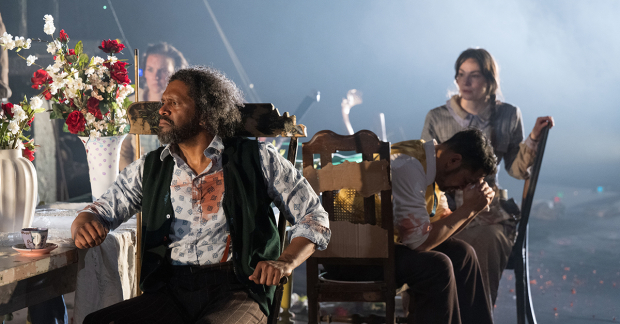Review: A Pretentiously Deconstructed Cherry Orchard at the Wilma Theatre in Philadelphia

(© Johanna Austin)
In the Wilma Theater's pretentiously deconstructed adaptation of The Cherry Orchard, Chekhov buys the farm long before the first axeblade drops. Director Dmitry Krymov slashes through the classic with craven indifference, essentially accomplishing what the developers in the play want to do to the beautiful but useless woodlet. By doing so, he sacrifices the work's emotional weight on the altar of experimentation, obscuring the very themes that render this 118-year-old drama timeless.
What emerges instead are feats of technical wizardry, including a mechanical split-flap that dominates the back wall of an expansive, otherwise barren set (designed by Krymov and Irina Kruzhilina, who also did the costumes) and essentially functions as the production's narrator. The train sign might deliver more dialogue than any of the performers onstage, who are mostly culled from the Wilma's resident company, the HotHouse. Rather than establishing character or building relationships, the actors crash about the stage in bursts of highly choreographed movement (by Jungwoong Kim) that often seem smirkingly incongruous and do little to serve the story.
A question that remains frustratingly unanswered is exactly what kind of story Krymov and the HotHouse want to tell with this adaptation. Chekhov layered his original script with explorations of loss and grief, set against a shifting cultural backdrop that almost foreshadows the looming Russian Revolution. Those topics still resonate today, for many reasons. A thoughtful observer could draw parallels to pandemic isolation, ever-widening wealth gaps, and roiling social unrest that dominate news cycles and personal lives. Yet this breathless reworking rarely lingers long enough in any moment to establish such connections.
The production retains only a skeleton of original plot. The aristocratic Lyubov Andreyevna Ranevskaya (Krista Apple) still returns from Paris to find her beloved ancestral home in foreclosure, where it falls into the clutches of self-made businessman Lopakhin (Justin Jain). As ever, she remains unwilling and unable to stop the sale, instead burying her head in the quicksand of frivolity and condescension. Ranevskaya's caprices affect everyone in her orbit, from her stoic adopted daughter Varya (Sarah Gliko), who carries an unrequited torch of Lopakhin, to her doddering older brother Gayev (Lindsay Smiling), who seems just as ambivalent as his sister but infinitely more vulnerable. The play's great tragic weight comes in the knowledge that the outcome is immovable, even as the solutions stare everyone in the face.
Beyond the basic outlines, though, Krymov modernizes the proceedings haphazardly. References to bitcoin and Twitter seem to exist only for the purpose of jarring anachronism. There's an extended scene where the actors play volleyball – net and all – with teams divided by social rank (landlords versus serfs). At one point, Smiling and Jaime Maseda, who is mysteriously cast as the ancient servant Firs, despite being in his thirties, break the fourth wall and speak to the audience directly about the ongoing Russia–Ukraine military conflict. The moment feels cheap and pandering in light of the situation's severity, particularly after revelations that the Wilma accepted (and subsequently returned) a sizable donation from a foundation that had, among its donors, a Russian oligarch with strong ties to Vladimir Putin.
The actors largely cannot be faulted for throwing themselves into Krymov's concept, and the best performances give a sense of what more traditional interpretations of these roles might look like. Trevor W. Fayle is deeply sympathetic as Trofimov, the melancholy tutor of Ranevskaya's late son Grisha, and Brett Ashley Robinson finds humor in the predicament of the servant Dunyasha, who's grown accustomed to the finer things in life. (Robinson also deserves combat pay for a scene that finds her perilously slipping again and again on a pile of slick, squishy berries – one of the staging's many pratfalls.) Matteo Scammell brings the right amount of smarm to the insouciant hanger-on Yasha, who longs to return to the glamour of Paris.
Apple is curiously wan as Ranevskaya, capturing neither her hauteur nor the pathos needed to convince you that everyone else in the play is preoccupied with managing her emotions. It's Jain, however, who suffers the biggest missed opportunity. A skilled comic actor, he brings a heightened energy to his performance that suits Lopahkin well, including the slightly pathetic torch he's carried for Ranevskaya since childhood. But the interpretation rarely moves beyond that. Krymov has cut most of the doomed romance between Lopahkin and Varya, to the disservice of both characters. It also leaves the reliably excellent Gliko with very little to do.
The Cherry Orchard doesn't need bells and whistles for relevance, and it certainly doesn't need to be rewritten. Chekhov planted seeds that still bear glorious fruit, but it's a garden that needs to be tended with care. Here, instead, we get a hatchet job.










